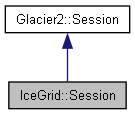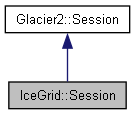A session object is used by IceGrid clients to allocate and release objects. More...
defined in <IceGrid/Session.ice>
interface Session extends Glacier2::Session { ... }


Operations | |
| Object * | allocateObjectById (Ice::Identity id) throws ObjectNotRegisteredException, AllocationException |
| Allocate an object. More... | |
| Object * | allocateObjectByType (string type) throws AllocationException |
| Allocate an object with the given type. More... | |
| idempotent void | keepAlive () |
| Keep the session alive. More... | |
| void | releaseObject (Ice::Identity id) throws ObjectNotRegisteredException, AllocationException |
Release an object that was allocated using allocateObjectById or allocateObjectByType. More... | |
| idempotent void | setAllocationTimeout (int timeout) |
| Set the allocation timeout. More... | |
 Operations inherited from Glacier2::Session Operations inherited from Glacier2::Session | |
| void | destroy () |
| Destroy the session. More... | |
Detailed Description
A session object is used by IceGrid clients to allocate and release objects.
Client sessions are created either via the Registry object or via the registry client SessionManager object.
- See also
- Registry
Operation Documentation
◆ allocateObjectById()
| Object* allocateObjectById | ( | Ice::Identity | id | ) | throws ObjectNotRegisteredException, AllocationException |
Allocate an object.
Depending on the allocation timeout, this operation might hang until the object is available or until the timeout is reached.
- Parameters
-
id The identity of the object to allocate.
- Returns
- The proxy of the allocated object.
- Exceptions
-
ObjectNotRegisteredException Raised if the object with the given identity is not registered with the registry. AllocationException Raised if the object can't be allocated.
- See also
- setAllocationTimeout
- releaseObject
◆ allocateObjectByType()
| Object* allocateObjectByType | ( | string | type | ) | throws AllocationException |
Allocate an object with the given type.
Depending on the allocation timeout, this operation can block until an object becomes available or until the timeout is reached.
- Parameters
-
type The type of the object.
- Returns
- The proxy of the allocated object.
- Exceptions
-
AllocationException Raised if the object could not be allocated.
- See also
- setAllocationTimeout
- releaseObject
◆ keepAlive()
| idempotent void keepAlive | ( | ) |
Keep the session alive.
Clients should call this operation regularly to prevent the server from reaping the session.
- See also
- Registry::getSessionTimeout
◆ releaseObject()
| void releaseObject | ( | Ice::Identity | id | ) | throws ObjectNotRegisteredException, AllocationException |
Release an object that was allocated using allocateObjectById or allocateObjectByType.
- Parameters
-
id The identity of the object to release.
- Exceptions
-
ObjectNotRegisteredException Raised if the object with the given identity is not registered with the registry. AllocationException Raised if the given object can't be released. This might happen if the object isn't allocatable or isn't allocated by the session.
◆ setAllocationTimeout()
| idempotent void setAllocationTimeout | ( | int | timeout | ) |
Set the allocation timeout.
If no objects are available for an allocation request, a call to allocateObjectById or allocateObjectByType will block for the duration of this timeout.
- Parameters
-
timeout The timeout in milliseconds.
The documentation for this interface was generated from the following file:
- IceGrid/Session.ice